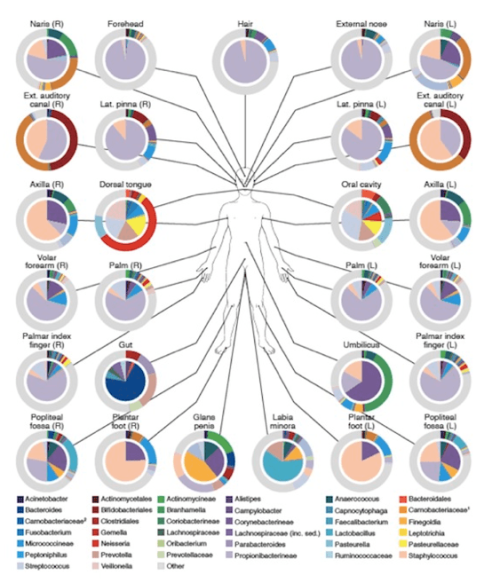Meet the millions of tiny organisms that call you home
Don't get all itchy. The bacteria you carry with you (and on you) may hold the keys to your health.
If you’re a germ-a-phobe, wash your hands and sit down for this. It turns out that your body—from your gut to the surface of your skin—is home to trillions of microbes. And that’s not necessarily a bad thing.
In fact, the bacteria that calls you home—AKA your microbiome—may hold the keys to boosting your overall health and avoiding a host (pun intended) of chronic diseases.
It’s so important, in fact, that the National Institute of Health’s Human Microbiome Project, which released its first results last year, is often seen as the follow-up to the sequencing of the Human Genome. “This is the frontier of new medicine, “ said Frank Lipman, MD, at a recent event. Even Michael Pollan is talking about it.
Intrigued? (And a little grossed out?) We created this cheat sheet so that you understand the basics of the bacteria that call you their landlord.
Meet your microbiome
Microbes are tiny, single-cell organisms, and the ones that love you outnumber the human cells in your body 10 to 1. Research and discussion tends to focus on those that line your GI tract, but they also live on your skin, in your mouth and nose, and in your most…sensitive areas. And they’re more diverse than Queens County. For example, there may be 5,000 different species that live in the human mouth.
Why you should get to know it
“Almost every process has these microbes as a common ingredient,” explains James Maskell, CEO of the soon-to-launch Revive Primary Care. “There are huge benefits to having a robust microbiome.” Maskell breaks those benefits down into improved digestion, metabolism, and immunity, three elements that together tend to dictate your entire level of health.
For example, a healthy community of microbes in your gut will effectively break down food and maintain balance there, which is crucial, since a large portion of your immune system lines its walls. If that same community is out of wack, it can lead to leaky gut, which causes inflammation in the body, a condition that has been linked to a long list of chronic illnesses, like autoimmune diseases, allergies, GI diseases like Crohn’s and Celiac, and more.
What affects the healthy balance of your microbiome
“The womb is a sterile environment,” explains Maskell, but as soon as you’re out, your microbiome starts taking shape. You acquire your first microbes coming through the vaginal canal, and breast milk contains another dose. So, if you’re a C-section baby or were fed formula, you’re slightly behind from the get-go.
Later, antibiotics play a huge role: While they’re good at destroying the bad guys, they kill indiscriminately, taking out innocent bystanders, the microbes who just want to help, along the way.
What you eat matters a lot, too. Research is showing microbes love whole, fibrous plant foods, and foods with their own microorganisms, like yogurt, kimchi, and kombucha, are great too. (Some doctors suggest pre- and probiotics, others caution against them.)
And then there are the microbes you pick up by skipping the hand sanitizer and doing boot camp crunches in Central Park.
“Science is finding that the people who have the most robust, deep, broad microbiomes are those who either grew up on a farm or have a pet or live in the countryside,” Maskell says.
Maybe we should try being less skeeved out by holding onto subway poles? —Lisa Elaine Held
Sign Up for Our Daily Newsletter
Get all the latest in wellness, trends, food, fitness, beauty, and more delivered right to your inbox.
Got it, you've been added to our email list.












